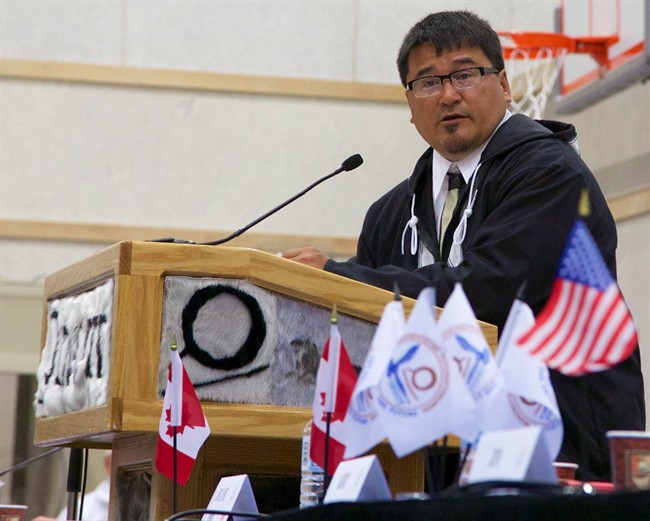INUVIK, N.W.T. – Hundreds of Inuit from across the circumpolar world are meeting in the Northwest Territories this week to discuss a unified front on everything from wildlife management to economic development.

“We recognize the Arctic is changing,” Duane Smith, president of the Inuit Circumpolar Council, said from Inuvik on Monday. “We recognize there are certain negative effects that are taking place, but there’s also opportunities.”
Delegations made up of Inuit groups from Russia, Alaska, Canada and Greenland are at the conference, the first time in 12 years that the council has held such a meeting in Canada. Together with representatives from governments, academe, industry and other organizations, about 600 people have swarmed this small northern town on Canada’s northwestern corner.
So many are in town that a river barge and a work camp are being used to house attendees.
READ MORE: Global warming – The changing face of the Arctic
Smith, an Inuvik man just elected to his fourth term as council president, said he’d like to see Inuit from different countries form a pan-Arctic council on wildlife. Seals, polar bears and whales routinely cross international borders, he pointed out, and Inuit from all countries need to ensure their voice is part of the global conversation on wildlife.
- What is a halal mortgage? How interest-free home financing works in Canada
- Capital gains changes are ‘really fair,’ Freeland says, as doctors cry foul
- Ontario doctors offer solutions to help address shortage of family physicians
- Budget 2024 failed to spark ‘political reboot’ for Liberals, polling suggests
“What I want to see is to get the Inuit people together to deal with wildlife management together, present their practices, their experiences, share their information and knowledge to try and develop broader working relationships with each other.”
Such a body could help local wildlife managers co-ordinate their efforts in an Arctic increasingly affected by climate change and industry, Smith suggested. It could also back up Inuit delegates at other international organizations such as the Convention on International Trade in Endangered Species, which has seen efforts to choke off trade in items such as polar bear hides.
“We will try to assist in influencing domestic policy as much as we can to reflect the Inuit rights and roles that are established for us,” Smith said. “This broader Inuit wildlife body would hopefully give influence and direction and guidance to (the council).”
READ MORE: Espionage returns to Cold War levels in melting Arctic
Smith said he’d like to see a similar group formed on economic development. Inuit already run businesses involved in energy drilling, shipping, airlines and fishing, and Smith said a place to share information would be helpful.
“The Arctic is opening up. The intent of that is to bring the Inuit expertise together to share their practices and their policies and look at potential collaborations.”
Smith acknowledges the wide range of national governments Inuit groups must work under: from Canada and the United States to Inuit home rule in Greenland to Russia’s authoritarianism. So far, he said, countries have been co-operative — including Russia, which has cracked down in the past on aboriginal involvement with international organizations.
“We have a very good relationship with Chukotka (the eastern province where Russian Inuit live),” said Smith. “We’re trying to enhance our relationship with Moscow and the broader Russian government.”
The conference runs through Thursday. A statement on decisions taken is expected then.

Comments